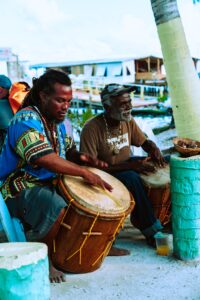The constitution provides for freedom of religion and prohibits discrimination on grounds of race or ethnicity. Churches run most public elementary schools and can observe Christian holidays or any others according to their discretion.
Over one-third of Belizeans practice various forms of Protestantism, such as Pentecostalism and Seventh Day Adventism. British loggers introduced Anglican beliefs into Belize in the 19th century.
Christianity
Belize’s official religion is Christianity, which is practiced predominantly throughout the country. Roman Catholicism remains the majority faith followed by Protestantism and various Christian sects including Pentecostal, Seventh Day Adventist and Anglican traditions. Additionally, indigenous populations practice forms of Mayan spiritual beliefs as part of their heritage.
Spanish colonists introduced Roman Catholicism into Maya culture during the 17th century, forcing Mayan residents to convert. It eventually became part of Mayan culture and traditions. Jesuits later established permanent residency there in 1851; today around 39 percent of its population are Roman Catholic.
Protestantism is the second-largest religion in Belize with approximately 30 percent of the population adhering to it, including Pentecostals, Seventh Day Adventists and Anglicans practice this faith. Many Protestants in Belize are descendants of British loggers who first arrived during the 19th century.
Other Christian sects such as Mennonites and Baptists are widely practiced in Belize. Additionally, evangelical Protestants work in cooperation with international NGOs and religious partners from both Canada and the US to carry out missionary work here; their partnerships include organizing joint conferences and outreach activities addressing health, poverty and education concerns.
Belize Constitution guarantees religious liberty, while laws and policies in place support this right. While the government does not forbid the practice of religion but instead regulates church establishment and operation. Religion groups must register with the Council of Churches which includes representatives from several major Christian denominations to gain registration as religious organizations; upon doing so they must submit a memorandum of association outlining objectives and mission, an article of association, as well as letters from foreign financial contributors if applicable, before filing with local authorities to continue operations; otherwise, they risk having their facilities shut down by authorities.
Islam
Belize’s Constitution guarantees freedom of religion, and multiple religious groups thrive in the country. A majority of its population are Christians – with Roman Catholicism being the largest denomination at nearly 50% – with other Christian groups such as Pentecostals, Seventh-day Adventists, Anglicans and Baptists also prevalent in society. Mennonites from Europe also maintain a strong presence while Garifuna people follow their own spiritual practices that stem from African roots.
The 2010 census reported a population of 577 Muslims in Belize. This does not account for members of Ahmadiyya Muslim Jamaat group which, according to its leaders, totals fewer than 160 members. A mosque has been constructed in Belize City while various groups rent space in order to offer services or classes.
Hinduism and Buddhism are also practiced religions in Belize, though their presence among residents tends to be limited and are typically found among immigrants. An estimated 15 percent of the population identifies with no religion.
Everywhere across the nation, churches and other groups provide Bible studies, sermons, and prayer services. Most schools also offer some form of religious education program to their students; students are strongly encouraged to participate.
Belize’s official church structures include Roman Catholic, Anglican and Presbyterian churches. If new churches wish to register with the Government of Belize they must submit a Memorandum of Association that outlines their purpose and mission statements as well as an Articles of Association document and Letter from Central Bank if any foreign financial contributors exist. Registration enables organizations to receive state recognition as well as negotiate contracts, sue and be sued legally as well as own property as well as hire/fire employees/open bank accounts as needed.
Hinduism
Belizeans of various religious affiliations include Mormons, Bahais and some Muslims. According to Belize’s Constitution, religious discrimination is forbidden and several religious groups collaborate with NGOs from North America in carrying out missionary work in Belize and participating in joint community projects such as HIV/AIDS outreach or poverty outreach efforts. Thirteen registered religious-based radio stations still operate across Belize.
Belize’s population is predominantly Christian. The most prevalent denominations include Catholicism and various forms of Protestantism; Catholics make up around 40% of the population while several Evangelical Protestant groups such as Assembly of God Church and Seventh-day Adventists also maintain significant presences within its borders.
Belize was initially influenced by immigration from Central America, who brought their religions with them and helped form its religious landscape. Today however, most Belizeans practice Christianity.
Though they no longer dominate society, traditional religions in Belize still exert a powerful impact. Garifuna religion forms part of Belizean heritage while Maya communities often adhere to different beliefs. Furthermore, Mennonites represent one religiously conservative Christian group that has grown significantly and now comprise 3% of population.
Some Belizeans practice Hinduism and Islam. Islam has found an audience among Kriols and Middle Eastern immigrants; even so, only 202 Baha’is were recorded during the 2010 Census but this religion continues to gain in popularity; Baha’is believe all religions should be free to practice freely.
Buddhism
Belize is predominantly Christian and Evangelical Protestantism-oriented. Islam, Hinduism and Buddhism also exist but may not be as widely practiced throughout the country. The government supports religious diversity and tolerance of differing beliefs, making discrimination on the grounds of religion illegal. The military employs a nondenominational chaplain and allows any religious group to use its facilities with prior approval. The Belize Chaplain Service (BCS) continues to promote various initiatives, such as counseling services for relatives of crime victims and police officers. Furthermore, BCS supports the government’s decision to submit its border dispute with Guatemala before the International Court of Justice due to members’ religious belief in social justice.
Early in the 20th century, British loggers brought Anglican beliefs with them when they settled in Belize; today these religions account for over 30 percent of the population. Other dominant religions in Belize include various forms of Protestantism like Pentecostalism, Seventh Day Adventism and Anglican Christianity as well as Mennonites who prefer living pacifically outside of Orange Walk District and refraining from joining military service.
At the core of ancient Maya religion was an array of gods and goddesses associated with natural elements – this can still be found today at Caracol and Xunantunich archaeological sites.
The Belize Constitution ensures freedom of religion and prohibits religious discrimination, with the government working closely with religious groups to foster tolerance of different beliefs while guaranteeing equal protection under the law. Schools must teach religious studies; however, students can opt-out if they choose not to participate; nondenominational “spirituality” classes covering morals, values, and world religions are also offered at some public schools.
Other
Belize is a predominantly Christian nation; however, its constitution guarantees freedom of religion. There are numerous religious groups represented here including Catholics, Protestants and African-based faiths such as Obeah and Myalism. No government entity endorses one faith over another and many schools provide regular spirituality or religious classes for students. While most Belizeans identify with Catholicism, more are choosing fundamentalist or evangelical faiths like Pentecostalism or Seventh Day Adventism as their religion of choice.
Catholics make up over 40% of the population, and religion plays an integral part of everyday life. Most elementary and secondary schools are church-managed; therefore many children attend religious classes at school unless their parents object.
Pentecostals or Seventh Day Adventists make up the vast majority of Protestants in Belize, and this group has seen tremendous growth over recent decades. Anglicans also maintain an important presence, thanks to British loggers who brought their faith over during the 19th century.
Muslim population estimates for 2010 were an estimated 577 individuals; this does not include Ahmadiyya Muslim Jamaat group members who may number less than 160 individuals.
Constitutionally, educational institutions cannot obligate students to attend religious ceremonies or observances, though exceptions are made for families that object. Although the military maintains a Christian chaplain for Christian services only, they do not restrict other faith practices within its ranks. Religious groups operating in Belize must register with the official companies registry in order to operate legally – much like registering a business; registration allows groups to negotiate contracts, sue/be sued when appropriate, hire employees as needed, own property as needed and lend/borrow money when needed.




